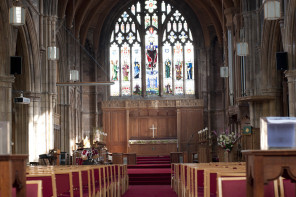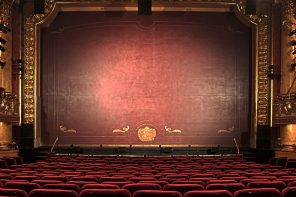This summer, I’ve returned to two places from my past. One was the place where my family has lived for nearly 20 years. The other was a place that I lived and worked for a majority of my adult life. Each of those places evoked memories – memories of laughter, tears, friends, and family. In each of these places, I still felt – in varying degrees – my ‘place’ within those locations. As I walked down familiar streets, I could remember specific conversations on park benches or when that house was painted blue. Re-visiting these places was more than just a nostalgic moment; it was a reminder of the ‘place’ that my embodied person inhabits in this world. It is this sense of ‘place’ within places that I want to reflect upon and suggest one of the reasons why a place maintains our ‘place’ within it. I’ll begin with the latter.
In his book, Culture Making, Andy Crouch offers this definition of culture: ‘Culture is what we make of the world. Culture is, first of all, the name for our relentless, restless human effort to take the world as it’s given to us and make something else.’ [1] Building on Crouch’s definition, culture is what we make of the places where we are. I want to suggest that it is our making of culture within a place that preserves our ‘place’ within it. When we’ve made ‘culture’, we have fundamentally changed the place we inhabit. Therefore, when we return, our imprint – our contribution – is still active in that place. To illustrate what I mean, perhaps a helpful contrast would be what one experiences when traveling. If one travels to Rome, for example, there is no doubt (in my mind, at least) that one will take in the delights of that place – art, architecture, food. And it is possible that one might be influenced or impacted by the culture that is experienced. However, when one leaves, there is no ‘place’ within that place created by the traveler. The reason is because culture has been consumed rather than made, a point that Crouch also makes later on in his book. [2]
A consideration of place in culture-making provides not only the context but also the materials by which we make. Again, Crouch: ‘…we start not with a blank slate [in our culture-making] but with all the richly encultured world that previous generations have handed to us.’ [3] Place helps us to discern our cultural ‘materials’. As an example, in one of the places I visited this summer, I came across a nature path that friends and I had cleared during one of my high school summer breaks. The path was still there, not as clear as we left it, but the path – the creation of culture in a specific place – reminded me that I still had a ‘place’ in a town I haven’t lived in for ten years.
To me, it seems that there is something fundamentally human about place-making. We are called to be cultivators in Genesis; we flourish as humans when we have a ‘place’ that roots us in an ever-shifting world. As we look forward into a world where place is increasing virtual and we can ‘be’ anywhere, how do we create ‘places’ that we can inhabit? Is it possible in an environment where there is no tangible place where culture is being made, for example, on Facebook or another virtual community?
[1] Andy Crouch, Culture Making: Recovering Our Creative Calling (Downers Grove: InterVarsity Press, 2008), 23.[2] Ibid., 69-73.
[3] Ibid., 73.




Sara,
Thanks for this great post! I’m a little jealous I didn’t write it myself! 🙂 You say that making a culture within a place is our way of inhabiting it. I was wondering if you could elaborate on what you think (or what Crouch thinks) making a culture would involve? Do you think it’s always creative or artistic (which I suppose would depend on your view of the arts)?
As far your question about virtual places, I think that’s very tricky because there is something inherently physical about place. We are physical beings that reside in physical places, so even when we are at our computers, we are still in a place or space. We can’t separate ourselves from that fact no matter how hard we try. That being the case, there seems to be something always artificial about virtual “places.” Wendell Berry once remarked that a community is always a community in a place…otherwise its just a figure of speech. He’d probably say there is no such thing as an “internet community”. This is because communities exist in a place for a long time. They involve time, work, memory, fidelity, hospitality, imagination. Some of these things can happen online, but I dare say not all of them (how can we really judge “good work” when we aren’t in close proximity to someone? why should we be faithful when we can just log off and live another life that may or not be the same as the one we portray in the virtual world?)
Thanks, Jenn! And thanks for your comments and questions. To answer your first question, I don’t think that making culture is always creative or artistic (but it’s not less than that). And I think Crouch would say the same thing, although Crouch does heavily emphasise the objects of our culture-making. I think that culture making can also include relationships, conversations, those things that are more ephemeral in nature.
Thanks for your insights regarding the relationship between place and the virtual. I appreciate what Wendell Berry said about what community requires – that it requires a physical place. So I suppose the question is whether or not someone can have a ‘place’ without having a physical location tied to that sense of place. I suppose that one can but it doesn’t seem like it would be very satisfying… at the very least, it would be a pale imitation of what place and community could be. Because real community requires all that you mention above, it’s a lot harder and takes more time. My concern is whether or not virtual places have given us an illusion of community that is so powerful, we don’t know what we’re missing.
Hi Jenn and Sara. This is an interesting discussion about making culture and place. I just wanted to get some clarity about Jenn’s question “Do you think it’s always creative or artistic (which I suppose would depend on your view of the arts)?” Sara answers that making culture is not always creative or artistic, but “it’s not less than that.” Are you using “creative” and “artistic” as synonyms? Many people define “creative” or “creativity” in a way that is much broader than “artistic.” For example, a common definition of “creativity” is “the production of something new and valuable.” According to this definition, “creativity” can be involved in nearly any human activity. If you define creativity as the production of something new and valuable, do you think that all culture making is creative?
Thanks, Jim, for drawing the distinction between artistic and creative. I agree with your definition of creativity and think that while all culture-making is not artistic, it is creative. I’m glad that you pushed us to make the distinction clearer as I think it’s problematic when creativity is only defined in relation to artistry, thereby isolating those who are not ‘artists’ from the culture-making process.
So, is “virtual community” actually an attempt at place-making, or an effort to simply augment the physical, material place? Which is like asking, are we attempting to create place in a new way by means of the virtual (ala Neal Stephenson), or are we extending our physical place-making by using virtualization as a tool?
Thanks, Dave, for the thought-provoking questions. I’m inclined to say that we fall between the two as I see something like Facebook facilitating both. For example, connecting with friends or family who one has known in a physical place via the virtual augments the physical (or maybe keeps us connected to the physical place where we’re from). On the other hand, as we become linked together under shared interests in the form of groups or as we write a blog that gains followers, there seems to be virtual ‘place-making’ happening. What do you think?
We certainly consider our virtual real estate to be almost a physical location (“come over to my blog”). I think that the inception of the virtual world, like what we saw in Tron, was that it would be what man truly created, almost ex nihilo. Today it functions more accurately as an augmenting tool, but science fiction has provided us with an interesting perpective on where we seem to believe that this can go.